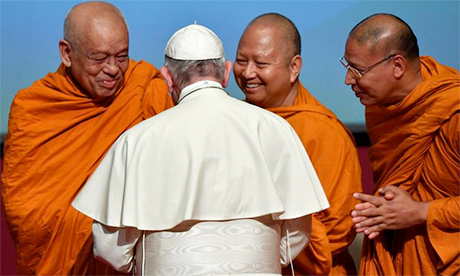Pope Francis’ visit to Thailand ended on a missionary note.
In a country where Catholics represent less than 1% of the population, Francis called on these modern missionaries in Thailand to give Christianity a fresh face.
“As I prepared for this meeting, I read, with some pain, that for many people Christianity is a foreign faith, a religion for foreigners. This should spur us to find ways to talk about the faith ‘in dialect,’ like a mother who sings lullabies to her child,” the pope said.
“With that same intimacy, let us give faith a Thai face and flesh, which involves much more than making translations.
“It is about letting the Gospel be stripped of fine but foreign garb; to let it ‘sing’ with the native music of this land and inspire the hearts of our brothers and sisters with the same beauty that set our own hearts on fire.”
“The Lord did not call us and send us forth into the world to impose obligations on people, or lay heavier burdens than those they already have, which are many, but rather to share joy, a beautiful, new and surprising horizon.”
The pope recalled Pope Benedict XVI saying that the Church does not grow by proselytizing but by attraction.
“This means we are not afraid to look for new symbols and images, for that particular music which can help awaken in the Thai people the amazement that the Lord wants to give us. Let us not be afraid to continue inculturating the Gospel.
“We need to seek new ways of transmitting the word, ways that are capable of mobilizing and awakening a desire to know the Lord. Who is that man? Who are these people who follow a man who was crucified?”
He made the comments while speaking during a meeting with priests, religious, seminarians and catechists at St. Peter’s Parish of Wat Roman village in Tha Kham, Bangkok, on Nov. 22.
In the course of his visit, Francis focused some of his attention on the humiliation of women and children who are forced into prostitution.
During an open-air Mass with 60,000 people at Bangkok’s national sports stadium, Francis urged Thais to not ignore the women and children trafficked for sex or migrants enslaved as fishermen and beggars.
“All of them are part of our family,” he told an estimated 60,000 people in the stadium for the evening service. “They are our mothers, our brothers and sisters.”
This was the second time he focussed on the plight of women and children forced into the sex trade.
Earlier, during a meeting with Prime Minister Prayuth Chan-ocha, he praised the Thai government’s efforts to fight human trafficking.
Prayuth didn’t make any reference to the problem in his remarks to Francis, though he stressed that Thailand had made great strides in promoting human rights.
“We have sought to strengthen the family institution and ensure equal opportunities for all groups in society, especially women and children,” he told Francis after a brief private meeting.
Thailand is concered a key trafficking destination as well as a source of sex workers and forced labour.
The four-day visit to Thailand was packed and included meeting the Prime Minister, Government authorities, the Buddhist supreme patriarch of Thailand, medical professionals, people with disabilities, Kin Maha Vajiralongkorn, priests, religious and seminaries, the bishops of Thailand, Jesuits in Thailand, Christian leaders of other religions, Mass at the National stadium and another with young people at the Cathedral.
Sources
